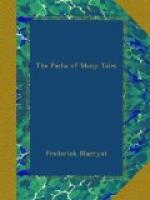“This, then,” said the chief Brahmin, “is the favoured youth, Acota. Remove the shawl, and lead him to the princess.”
The mutes obeyed, and to the horror of Babe-bi-bobu, there stood Acota, as she thought, with a face so scarred and burnt, that his features were not distinguishable. She started from her throne, uttered one wild shriek, which was said to have been heard by the whole ten square miles of population, and fainted in the arms of her attendants.
“We know his dress, most noble grandees,” continued the chief Brahmin, “but how can we recognise in that object, the youth without scar or blemish? It is the will of Heaven,” continued the chief Brahmin, piously and reverently bending low. And all the other grandees replied in the same pious manner, “It is the will of Heaven.” “I say,” continued the chief Brahmin, “that this must have been occasioned by the princess not having chosen as ordained by the will of her father, but having impiously left to chance what was to have been decided by free will. Is not the hand, the finger of Providence made manifest?” continued he, appealing to the grandees. And they all bowed low, and declared that the hand and finger of Providence were manifest; while the mutes, who knew that it was their hands and fingers which had done the deed, chuckled as well as they could with the remnants of their tongues. “And now,” continued the chief Brahmin, “we must obey the will of the late king, which expressly states, that if any accident should happen after the choice of the princess had been made, that I, the chief of our holy religion, should select her husband. By virtue, then, of my power, I call thee forth, my son, Mezrimbi, to take his place. Bow down to Mezrimbi, the future king of Souffraria.”
Acota, muffled up to the eyes, and dressed in the garments of Mezrimbi, stepped forth, and the chief Brahmin, and all present, in pursuance to his order, prostrated themselves before Acota, with their foreheads in the dust. Acota took that opportunity of removing the shawl, and, when they rose up, stood by the throne, resplendent in his beauty and his pride. At the sight of him, the chief Brahmin raised a cry, which was heard, not only further than the shriek of the beautiful Princess Babe-bi-bobu, but had the effect of recalling her to life and recollection. All joined in the cry of astonishment when they beheld Acota in the garments of Mezrimbi.
“Who, then, art thou?” exclaimed the chief Brahmin, to his son, in Acota’s dress.
“I am,” exclaimed his son, exhausted with pain and mortification, “I am—I was Mezrimbi.”
“Grandees,” cried Acota, “as the chief Brahmin has already asserted, and as you have agreed, in that you behold the finger of Heaven, which ever punishes hypocrisy, cruelty, and injustice;” and the chief Brahmin fell down in a fit, and was carried out, with his unfortunate son Mezrimbi.




